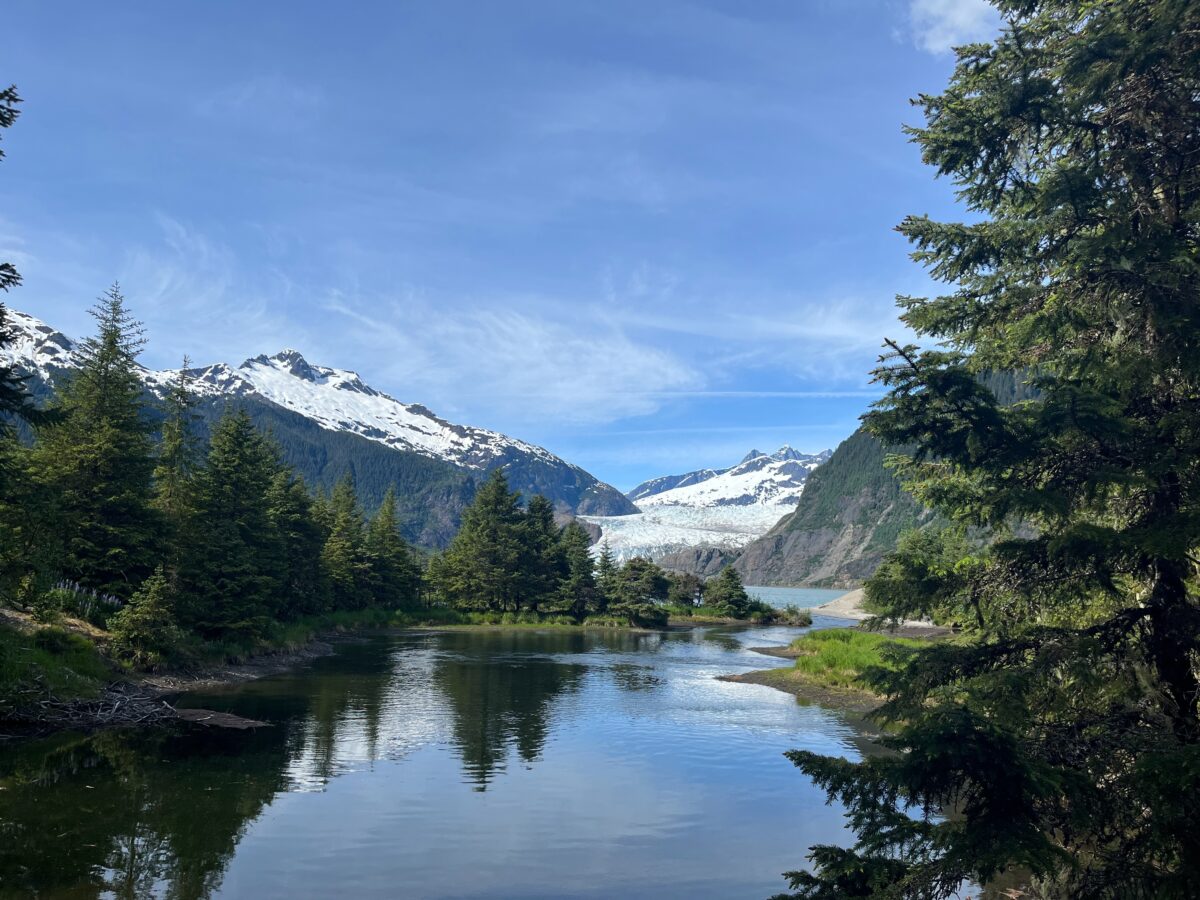The Trump administration has recently finalized its decision to open the United States’ largest forest to logging and development. The Tongass National Forest in southeastern Alaska has been protected from such activity by the 2001 “Roadless Rule,” which prohibits construction and reconstruction of roads in otherwise difficult-to-access areas of the National Forest System. The law doesn’t eliminate the possibility of any development activity at all—in fact, more than fifty projects, including mining, logging, and construction ventures, have been approved since the rule first took effect—but it is the principal barrier between the 16.7 million acre forest and its unchecked exploitation.
Scientists refer to the Tongass as the “lungs of the country,” a nickname supported by a 2019 carbon analysis report that draws parallels between the significance of the Amazon rainforest in South America and the Tongass in North America. The forest holds over 600 million metric tons of carbon dioxide, the equivalent of almost half the United States’ annual carbon emissions, making it by far the largest carbon sink in the country and a significant bulwark against climate change. The U.S. Forest Service’s review of the rollback made clear that further highway construction would continue to fragment the area, damaging the natural patterns of deer, wolf, and bear populations throughout the region. Tim Bristol, executive director of Alaska-based company SalmonState, said in an interview, “The largest intact temperate rainforest left in the world, the millions of salmon, 650 million tons of carbon storage, and the people, businesses, and jobs that depend on an intact Tongass National Forest are too important.”
The native peoples of the Tongass region have even more reason for concern. A rollback on the protective policies of the Roadless Rule would open old-growth trees used for canoes to logging, salmon watersheds to pollution and overfishing, and land with traditional dwellings and burial sites to tourism and construction. This distress has been largely ignored by the U.S. federal government; according to Joel Jackson, the President of the Organized Village of Kake in the Tongass region, “They [the federal government] seem to minimize our way of life.” Marina Anderson, a member of the Organized Village of Kasaan, furthered the thought by explaining that, sometimes, the cultural and linguistic barriers between indigenous peoples and Washington D.C. make it impossible for policymakers to understand the full effects of their actions. She says, “Our way of life is something that isn’t always transcribable to English … My relationship to the Tongass goes so deep that I’m made aware of it every day and in different ways. The salmon that I eat, that comes from the Tongass. The air that I breathe, that comes from the Tongass.”
This conflict is representative of a pattern emerging within American politics: policy that favors profit over the environment and over people. In the case of the Tongass, the pleas of eleven southeastern Alaskan tribes have been ignored since their official petition was filed in July, which called for steps towards a “Traditional Homelands Conservation Rule” that would require the federal government to work alongside native nations’ governments. Explicit warnings against expanding logging in the Tongass by think tanks, research centers, and scientists have fallen on deaf ears in a country with a history of developing essential pieces of land, especially now in the Trump administration.
Wilderness experts and timber industry groups have come together to refute the government’s claims that logging is necessary to southeastern Alaska’s wealth. According to Nicole Whittington-Evans, director of the Alaskan branch of Defenders of Wildlife, “Clear-cutting ancient forests is bad for fish and wildlife, bad for the region’s tourism and fishing industries, expensive for taxpayers and makes no economic sense.” The Alaska Forest Association explained that the main reason the Roadless Rule was being eliminated, to allow construction of the South Revilla timber project, is extremely similar to another project that has now been discontinued over a lack of interest. A timber industry group weighed in: “Why waste time analyzing and marking harvest units that have no hope of being financially viable?” Proof that profit is impossible should easily tip the scales back in favor of ecological protection.
Environmentalists, logging industry professionals, native governments, and, according to the Forest Service, an overwhelming 96% of the public are against a reversal of the Roadless Rule. The Alaskan Wilderness League put it best: “Why, with our climate in crisis and Alaska experiencing climate impacts more acutely than most, are we even discussing chopping down a natural climate solution and a regional economic powerhouse just to ship overseas?”
Bibliography
Aton, A. (2019, October 22). Experts claim admin used ‘misinformation’ to justify logging. Climatewire. Retrieved October 16, 2020, from https://www.eenews.net/stories/1061341741
Davenport, C. (2020, September 24). Trump Administration Releases Plan to Open Tongass Forest to Logging. The New York Times. Retrieved October 16, 2020, from https://www.nytimes.com/2020/09/24/climate/tongass-logging.html
Jenkins, E. (2020, July 21). With a Roadless Rule decision pending, tribal governments petition for new process. Alaska Public Media. Retrieved October 16, 2020, from https://www.alaskapublic.org/2020/07/21/with-a-roadless-rule-decision-pending-tribal-governments-petition-for-new-process/
Randall, C. (2020, September 27). Trump Administration Set To Lift Protections On Alaska’s Tongass National Forest. Forbes. Retrieved October 16, 2020, from https://www.forbes.com/sites/cassidyrandall/2020/09/27/trump-administration-set-to-lift-protections-on-one-of-alaskas-most-beloved-tourism-destinations/#36d50f057fef
Segall, P. (2019, December 28). Report: Tongass Among Forests Crucial for Climate Regulation. U.S. News & World Report. Retrieved October 16, 2020, from https://www.usnews.com/news/best-states/alaska/articles/2019-12-28/report-tongass-among-forests-crucial-for-climate-regulation
Southeast Alaska logging proposal moves forward despite opposition and uncertainty. (2020, September 10). Anchorage Daily News. Retrieved October 16, 2020, from https://www.adn.com/nation-world/2020/09/10/southeast-alaska-logging-proposal-moves-forward-despite-opposition-and-uncertainty/
United States Forest Service. (2020, May). Alaska Roadless Rule: Draft Environmental Impact Statement, Public Comment Report. Retrieved October 16, 2020, from https://d3n8a8pro7vhmx.cloudfront.net/tongassblueprint/pages/1960/attachments/original/1590607105/Alaska_Roadless_Rule_-_DEIS_Public_Comment_Report_%28May_2020%29.pdf?1590607105
Wamsley, L. (2020, September 25). Trump Administration Moves To Expand Development In Alaska’s Tongass National Forest. NPR. Retrieved October 16, 2020, from https://www.npr.org/2020/09/25/916932812/trump-administration-moves-to-allow-logging-in-alaskas-tongass-national-forest

